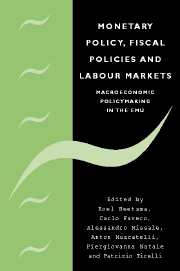Book contents
- Frontmatter
- Contents
- List of figures
- List of tables
- List of contributors
- Acknowledgements
- Editors' introduction
- Part I Monetary policy
- Part II Fiscal policies
- 5 The interaction between monetary and fiscal policies in a monetary union: a review of recent literature
- 6 Independent or coordinated? Monetary and fiscal policy in EMU
- 7 Interaction of fiscal policies in the euro area: how much pressure on the ECB?
- 8 The macroeconomic impact of different speeds of debt stabilisation in EMU
- 9 Fiscal shocks and policy regimes in some OECD countries
- 10 Monetary and fiscal policy interactions over the cycle: some empirical evidence
- Part III Labour markets
- Index
8 - The macroeconomic impact of different speeds of debt stabilisation in EMU
from Part II - Fiscal policies
Published online by Cambridge University Press: 22 September 2009
- Frontmatter
- Contents
- List of figures
- List of tables
- List of contributors
- Acknowledgements
- Editors' introduction
- Part I Monetary policy
- Part II Fiscal policies
- 5 The interaction between monetary and fiscal policies in a monetary union: a review of recent literature
- 6 Independent or coordinated? Monetary and fiscal policy in EMU
- 7 Interaction of fiscal policies in the euro area: how much pressure on the ECB?
- 8 The macroeconomic impact of different speeds of debt stabilisation in EMU
- 9 Fiscal shocks and policy regimes in some OECD countries
- 10 Monetary and fiscal policy interactions over the cycle: some empirical evidence
- Part III Labour markets
- Index
Summary
The potential importance of fiscal policy in influencing inflation has recently been highlighted, following Woodford (1998); under the heading of the ‘Fiscal Theory of the Price Level’ (FTPL). The Fiscal Theory has also been extended to consider the case of independent fiscal authorities operating under a common monetary authority (see Woodford 1998; Dupor 2000; Bergin 2000; Sims 1997).
The fiscal theory essentially characterises two regimes – one where the fiscal authorities act prudently, government debt does not constitute an element of net wealth and monetary policy is free to target inflation, and another, where fiscal insolvency requires surprise inflation to deflate the nominal value of government debt. In Leith and Wren-Lewis (2001) we relax a number of assumptions underlying the Fiscal Theory of the price level by considering a two-country model in continuous time with overlapping generations of consumers supplying labour to imperfectly competitive firms which can only adjust their prices infrequently. Policy is described by simple linear feedback rules. We find that there are two stable policy regimes similar to those in the Fiscal Theory: one where the government follows a rule which stabilises its debt and monetary policy is ‘active’ in the sense of Leeper (1991) and another where an imprudent government requires monetary policy to be ‘passive’. However, unlike the Fiscal Theory, both monetary and fiscal policy affect inflation in both regimes.
- Type
- Chapter
- Information
- Monetary Policy, Fiscal Policies and Labour MarketsMacroeconomic Policymaking in the EMU, pp. 191 - 223Publisher: Cambridge University PressPrint publication year: 2004



